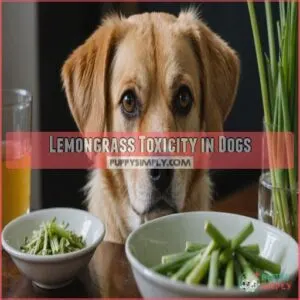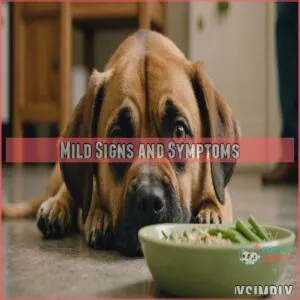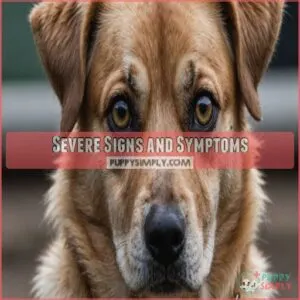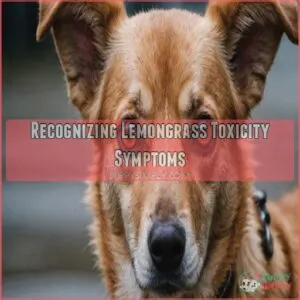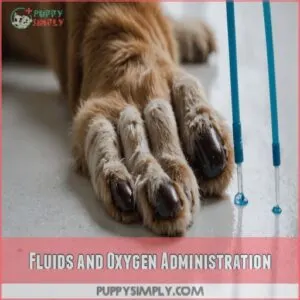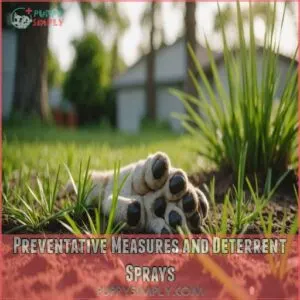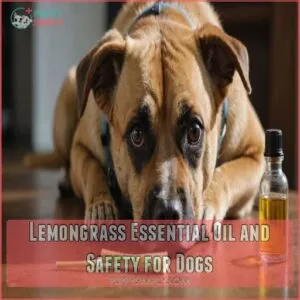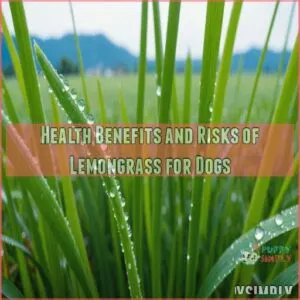This site is supported by our readers. We may earn a commission, at no cost to you, if you purchase through links.

It’s best to keep lemongrass out of reach.
While it might add zest to your favorite dish, it’s not dog-friendly.
Lemongrass can cause vomiting or an upset stomach in small amounts, and in larger quantities, it could lead to severe issues like gastrointestinal blockage or rare cyanide poisoning.
So, ditch any lemongrass-snacking ideas your pup might have.
Imagine trying to explain that to your vet!
Always err on the side of caution regarding your furry friend’s diet.
Curious about more pet-safe herbs?
Keep reading for those insights!
Table Of Contents
- Key Takeaways
- Lemongrass Toxicity in Dogs
- Signs of Lemongrass Toxicity in Dogs
- Treatment and Prevention of Lemongrass Toxicity
- Lemongrass Essential Oil and Safety for Dogs
- Health Benefits and Risks of Lemongrass for Dogs
- Safe Use of Lemongrass on Dogs
- Can Dogs Eat Lemongrass Safely
- Frequently Asked Questions (FAQs)
- Can dogs eat lemongrass?
- How to use lemon grass for cooking?
- Is lemongrass essential oil safe for dogs?
- Why does my dog have diarrhea if he eats lemongrass?
- Do lemongrass scented candles keep dogs away?
- Can a dog eat grass?
- Is lemongrass safe for dogs?
- What are the health benefits of lemongrass for dogs?
- How should I prepare lemongrass for my dog?
- Are there risks associated with giving my dog too much lemongrass at once?
- Can I use lemongrass oil on my dog topically or for aromatherapy purposes?
- Can dogs eat soup with lemongrass?
- Is lemongrass calming for dogs?
- Is lemongrass safe for pets to smell?
- Is lemongrass oil safe for dogs to lick?
- How does lemongrass affect a dogs breath?
- Can lemongrass tea soothe my dogs stomach?
- Are there specific lemongrass treats for dogs?
- Is cooked lemongrass safer for dogs?
- Can lemongrass help with dog anxiety?
- Conclusion
Key Takeaways
- Keep lemongrass out of your dog’s reach; even small amounts can cause stomach upset or more serious health problems like cyanide poisoning.
- If your dog consumes lemongrass, watch for symptoms like vomiting or lethargy, and contact your vet if signs persist or worsen.
- Avoid using undiluted lemongrass essential oils on dogs, as they can lead to skin irritation and other health issues.
- For any lemongrass-related dietary changes or treatments, always consult your veterinarian to ensure your dog’s safety.
Lemongrass Toxicity in Dogs
You might think your dog munching on a few lemongrass leaves is harmless, but those fragrant blades hide a secret: cyanogenic glycosides that can lead to cyanide poisoning.
Even small nibbles can cause tummy troubles or a serious blockage, so let’s keep your furry friend safe and away from this deceptively tasty plant.
What Makes Lemongrass Toxic
Ever wonder why lemongrass isn’t the best snack for your pup?
This aromatic plant, while pleasing to our senses, can turn tricky in a canine stomach.
Its sharp leaves can cause digestive issues, acting like an unwanted guest at dinner, causing blockage problems.
Watch out for lemongrass toxicity in dogs, as even plant parts pose a risk.
Cyanogenic Glycosides and Cyanide Poisoning
Explore lemongrass, and you’ll find cyanogenic glycosides lurking, ready to pounce—well, not really, but these compounds can turn into cyanide in your dog’s body.
Though usually harmless in small amounts, too much can cause serious cyanide poisoning.
Keeping an eye on your furry buddy is essential for dog health and lemongrass safety.
Gastrointestinal Upset and Blockage
Picture your dog’s insides like a delicate machine.
Lemongrass’s sharp leaves can jam the works, causing digestion woes and even blockage risks.
Here’s how to keep your furry friend safe:
- Prevent Access: Block off lemongrass plants.
- Watch Symptoms: Vomiting or lethargy needs attention.
- Seek Treatment: Contact your vet promptly for lemongrass poisoning symptoms in dogs.
Signs of Lemongrass Toxicity in Dogs
When your dog’s in the backyard munching on everything green, it’s key to recognize if that lemongrass snack leads to trouble.
Watch for mild signs like vomiting or drooling; if symptoms turn serious with breathing issues or wobbly walking, it’s time for swift action!
Mild Signs and Symptoms
So, your dog gobbled some lemongrass? Let’s look at some early warning signs.
Mild lemongrass toxicity in dogs often shows up as digestive upset.
Here’s a quick guide:
| Symptom | Severity |
|---|---|
| Vomiting | Mild to Moderate |
| Nausea | Mild |
| Stomach Pain | Mild to Moderate |
| Loss of Appetite | Mild |
Keep a close eye on your pup; these are usually minor, but always consult your vet if you’re worried.
Severe Signs and Symptoms
Your furry friend’s breathing difficulties, a wobbly gait, or rapid heart rate changes might’ve you barking up the wrong tree, but these can be severe signs of lemongrass poisoning in dogs, similar to drunken dog behavior caused by issues like vestibular disease or heatstroke.
Red gums and collapse are no laughing matter, either.
Lemongrass’
Recognizing Lemongrass Toxicity Symptoms
If you’ve noticed signs like vomiting or drooling in your pup and wonder if lemongrass is the culprit, you’re not alone.
Recognizing lemongrass toxicity symptoms in dogs is key.
If you suspect your dog has ingested lemongrass, you should research dog lemongrass symptoms.
Look for red gums, breathing issues, or
Treatment and Prevention of Lemongrass Toxicity
When your dog gets into lemongrass quick action can make all the difference in keeping them safe and healthy.
By understanding how to support their recovery with fluids, oxygen, or medicine, and knowing a few smart prevention strategies, you can minimize the risk and keep your furry friend out of trouble.
Supporting The Dog’s Body and Addressing Complications
Recognizing lemongrass toxicity symptoms in dogs means stepping into action.
Address any complications promptly to support your pet’s recovery.
Think of it like being a detective; you need to gather clues and take swift action.
Veterinary intervention may be necessary for serious cases.
Ensuring hydration therapy and offering supportive care helps manage gastrointestinal complications, reducing the risk of lemongrass poisoning.
Fluids and Oxygen Administration
Got a pup in trouble? With lemongrass toxicity, hydration and breathing are top priorities. Imagine this relief for your four-legged friend:
- Dehydration busters: IV fluids get the job done.
- Oxygen therapy: Clears the air (literally!).
- Respiratory distress: Minimize panic.
- Supportive care: Steady and comforting.
- Veterinary emergency care: Always ready, just in case.
Imaging Tests and Sodium Nitrate or Sodium Thiosulphate Administration
Seeing the veterinarian hold up an X-ray can feel like watching a sci-fi movie, but imaging tests are your dog’s superhero in detecting blockages from lemongrass.
Suspecting hydrogen cyanide poisoning? Sodium nitrate or thiosulphate swoop in to neutralize the villain.
Together with veterinary care, they’re your arsenal against lemongrass toxicity in dogs, keeping your furry friend safe and sound.
Preventative Measures and Deterrent Sprays
After dealing with a lemongrass incident, prevention’s key.
To keep your lawn safe from other potential hazards, consider choosing dog-friendly grass types, which can help minimize damage from pet accidents and play.
Keep lemongrass out of reach using barriers like fences or containers.
Consider homemade deterrent sprays using safe ingredients like citrus peels—their scent often deters dogs.
Remember, repellent effectiveness
Lemongrass Essential Oil and Safety for Dogs
Lemongrass essential oil might seem like a great natural option for your dog, but using undiluted oils can lead to irritation and health issues.
Stick to products where the oil is properly diluted, and remember, if your pup accidentally ingests it, you need to rush to the vet immediately.
Risks of Undiluted Essential Oils
You’ve taken steps to prevent lemongrass toxicity, but let’s chat about undiluted lemongrass essential oils.
Used incorrectly, they can cause serious issues for dogs.
Watch out for:
- Skin irritation from direct contact;
- Respiratory issues if inhalation occurs;
- Ingestion dangers leading to severe reactions.
Keep your furry friend safe by avoiding undiluted oils entirely.
Safe Use of Diluted Lemongrass Essential Oil
Undiluted oils can be tricky, so let’s focus on the safer route: diluted lemongrass essential oil.
It can be a handy flea repellent when mixed correctly.
Keep an eye on dilution ratios to avoid skin allergies.
| DIY Recipe | Dilution Ratios | Pet Shampoo Use |
|---|---|---|
| Flea Spray | 1:10 | Safe Mix |
| Skin Soother | 1:15 | Test First |
| Coat Shine | 1:20 | Gentle Option |
Always check for skin reactions before regular use.
Ingestion of Lemongrass Essential Oil
When your dog ingests lemongrass essential oil, it can spell trouble.
Despite its pleasant aroma, the oil’s concentrated nature poses significant pet poisoning risks, making immediate veterinary attention essential.
Always practice dilution safety, and remember that topical application is safer.
Keep lemongrass oil out of reach to avoid unnecessary adventures—trust me, no one wants a surprise trip to the vet!
Health Benefits and Risks of Lemongrass for Dogs
You might be tempted to add lemongrass to your dog’s care routine because of its natural insect-repelling properties and potential soothing effects on skin conditions.
However, it’s important to understand that while small amounts can be beneficial, they can also lead to side effects or reactions, so always consult with your veterinarian first.
Natural Insect-Repelling Properties
Moving from safety concerns to benefits, lemongrass shines with its natural insect-repelling properties, a boon for concerned pet owners. It’s like nature’s very own bug shield!
- DIY repellent recipes
- Safe essential oil blends
- Pet-safe alternatives
- Lemongrass vs. citronella effectiveness
- Beware citronella toxicity
These options help keep pesky bugs at bay.
Soothing Skin Conditions
Besides keeping fleas at bay, lemongrass might also soothe your dog’s irritated skin.
Think of it as a natural itch reliever!
For minor skin irritations, you might try a diluted lemongrass solution as a homemade remedy.
However, always test a tiny spot first to check for allergies.
Remember, lemongrass oil for dogs needs careful handling.
Consult your vet before using lemongrass for skin conditions or any other dog health issue.
They can advise you on safe topical application and proper dosage.
Potential Side Effects and Reactions
Occasionally, lemongrass can cause unexpected reactions in dogs, and it’s important to remember that, like lemons, some plants can be toxic to them due to citric acid and essential oils.
- Skin irritation: Redness or itchiness can occur.
- Digestive issues: Vomiting and diarrhea are possible.
Safe Use of Lemongrass on Dogs
When using lemongrass for your dog, start with proper dilution and do a quick skin test to make sure safety.
Keep an eye out for any allergic reactions.
Store the lemongrass in a cool, dry place—your shoe collection doesn’t count!
Proper Dilution and Skin Testing
Before you start using lemongrass oil on Fido, make sure it’s safely diluted.
A little TLC can prevent lemongrass toxicity in dogs.
Conduct a skin test—dab diluted oil on a small area.
Wait to see any reaction.
DIY dilution using safe ingredients is key to avoiding irritation.
Keep an eye on dilution ratios and test area size.
| Concern | Emojis | Quick Tip |
|---|---|---|
| Dilution Ratios | ⚖️ | Keep it mild! |
| Test Area Size | | Small is smart. |
| Reaction Time | ⏰ | Watch and wait! |
| Safe Ingredients | 離 | Go natural! |
| DIY Dilution | ️ | Mix carefully! |
Monitoring for Reactions and Allergic Responses
After ensuring proper dilution and skin testing, it’s key to keep an eye on your dog for any lemongrass allergies.
Watch out for these signs:
- Red, itchy spots: Skin reactions can appear quickly.
- **
If you’re considering using lemongrass-based products, research lemongrass dog reaction to better understand potential risks.
Storage and Handling of Lemongrass
To keep lemongrass safe for your furry friend, store it right.
Fresh or dried, lemongrass deserves a cool, dry spot away from sunlight.
Got leftovers? Don’t let them go bad.
Treat disposal like a game of fetch—prompt and proper.
Here’s a quick table to help:
| Type | Storage | Disposal Tip |
|---|---|---|
| Fresh | Fridge | Compost or bin |
| Dried | Airtight container | Trash or compost |
| Essential Oil | Cool, dark place | Per recycling guidelines |
| Culled Plants | Compost heap | Make sure there’s no direct contact |
| Trimmings | Compost pile | Away from pets and pests |
Can Dogs Eat Lemongrass Safely
You might wonder if it’s okay to let your dog nibble on lemongrass, and while a small taste probably won’t harm them, it’s best to exercise caution.
Lemongrass can cause tummy troubles if your furry friend eats too much, so always consult your vet before you let them explore new flavors.
Moderation and Proper Use
Smart pet parents know that moderation is key!
Using lemongrass safely with your dog means understanding the right dosage.
A tiny bit of fresh lemongrass in their food is usually fine, but avoid large quantities.
Remember, every dog’s different.
- Monitor your pup for any unusual reactions.
- Always consult your vet before adding new things to their diet, even herbs.
- Keep lemongrass essential oil far away from your furry friend; it’s not for internal use!
Potential Risks and Precautions
When considering lemongrass for your furry friend, watch for potential risks.
Lemongrass allergies can lead to dog behavior changes and other lemongrass toxicity symptoms in dogs.
You can find lemongrass products designed for dogs, such as lemongrass dog oil, which can be a good starting point for safe usage.
Always practice safe storage methods to prevent
Consulting a Veterinarian for Guidance
Veterinary care is your best friend when pondering lemongrass and dogs.
Sure, it might sound like a tasty herbal twist for Fido’s diet, but remember, a vet knows the nuances—lemongrass dosage, essential oil use, and potential symptoms.
They guide you through dietary concerns and alternative remedies, ensuring you’re not barking up the wrong tree with lemongrass toxicity symptoms in dogs.
Frequently Asked Questions (FAQs)
Can dogs eat lemongrass?
Imagine lemongrass as a charming but mischievous pixie in your garden.
While small amounts are generally safe, dogs might experience tummy troubles.
It’s best to keep them away and consult your vet for advice.
How to use lemon grass for cooking?
Chop lemongrass finely, using the tender inner stalks for soups or curries.
It’s like inviting a citrusy symphony into your dish!
Add it to marinades for zing or steep it to make invigorating tea.
Enjoy!
Is lemongrass essential oil safe for dogs?
Ironically, that "natural" scent isn’t so natural for your dog.
Pure lemongrass essential oil’s potent, so it’s a big no-no.
Diluted versions in pet products? Generally okay, but always check the label and your vet.
Why does my dog have diarrhea if he eats lemongrass?
When your dog munches on lemongrass, it can trigger diarrhea due to its fibrous texture and potential for cyanide production.
Both factors can upset their stomachs, leading to gastrointestinal troubles and discomfort.
Do lemongrass scented candles keep dogs away?
Burning lemongrass candles may scatter mosquitoes, not dogs.
Dogs mightn’t mind the scent, but if you’re hoping to create a dog-free zone with candles, you might end up barking up the wrong tree.
Can a dog eat grass?
Sure, dogs can munch on grass occasionally, and it’s generally safe.
They do it out of curiosity, boredom, or maybe to aid digestion.
However, keep an eye out for pesticides which can be harmful.
Is lemongrass safe for dogs?
Twenty-six percent of pet owners look into natural remedies.
While lemongrass smells great in tea, it can upset your dog’s stomach.
Tiny amounts are safe, but any more might lead to a vet visit.
Stay cautious!
What are the health benefits of lemongrass for dogs?
Lemongrass can help repel fleas and soothe skin conditions for your dog.
It also has calming properties, which might be handy during thunderstorms.
Always check with your vet before using it to make sure it’s safe for your pup.
How should I prepare lemongrass for my dog?
To safely prepare lemongrass for your dog, use a small amount, finely chop it to avoid digestive issues, and mix it into food moderately.
Always consult your vet first to make sure it’s safe for your pet.
Are there risks associated with giving my dog too much lemongrass at once?
Don’t jump the gun!
Yes, too much lemongrass can upset your dog’s tummy, causing vomiting or diarrhea.
Small amounts are usually fine, but always check with your vet first, just to be safe.
Can I use lemongrass oil on my dog topically or for aromatherapy purposes?
You can use lemongrass oil on your dog, but dilute it first.
A patch test helps check for skin reactions.
Use it sparingly for aromatherapy, ensuring good ventilation.
Always ask a vet before using essential oils.
Can dogs eat soup with lemongrass?
Dogs eating soup with lemongrass might face upset stomachs, as lemongrass can be harsh on them.
Check soup ingredients for anything harmful.
If unsure, consult your vet—better safe than sorry regarding dog diets!
Is lemongrass calming for dogs?
Lemongrass might’ve a calming effect on dogs due to its soothing aroma and traditional use in herbal remedies.
Lemongrass might’ve a calming effect on dogs due to its soothing aroma and traditional use in herbal remedies.
Always consult your vet before using it, as some dogs may react differently to herbal treatments.
Is lemongrass safe for pets to smell?
Imagine a meadow full of breezy moments.
Lemongrass scent wafting about is generally safe for pets to sniff, as long as it’s not too concentrated.
Keep any essential oils away from curious noses, though!
Is lemongrass oil safe for dogs to lick?
It’s not safe for dogs to lick lemongrass oil.
This concentrated oil can irritate their skin and cause digestive upset.
Always keep essential oils out of reach, and consult your vet before using any on pets.
How does lemongrass affect a dogs breath?
Did you know that 70% of dog owners worry about their pet’s breath?
Small amounts of lemongrass might freshen your dog’s breath, but large amounts can cause tummy trouble.
Always consult your vet before trying new things!
Can lemongrass tea soothe my dogs stomach?
Lemongrass tea might sound soothing, but it can upset your dog’s stomach due to its fibrous nature and potential toxicity.
It’s best to stick with vet-approved remedies for tummy troubles instead of brewing up herbal teas.
Are there specific lemongrass treats for dogs?
Picture a tasty quest where dog treats hold lemongrass as a gentle knight combating fleas.
Companies sometimes offer such treats, promoting natural wellness.
Always check ingredients and vet advice, ensuring your dog’s safety and satisfaction on this journey.
Is cooked lemongrass safer for dogs?
Cooking lemongrass can make it slightly safer for dogs since it becomes less tough and fibrous.
However, it still poses risks like gastrointestinal upset.
Best play it safe—avoid feeding them any form of lemongrass.
Can lemongrass help with dog anxiety?
You’ve probably heard lemongrass might ease a dog’s anxiety.
While it has calming properties, use caution.
Always consult your vet first and consider safer, proven options like dog-safe essential oil diffusers for stress relief.
Conclusion
Imagine your dog turning into a grass-chomping connoisseur, eyeing lemongrass as a gourmet treat! Sounds funny, but it’s better to keep lemongrass away from your pup. Even small amounts can upset their stomach, while larger bites could lead to serious health risks.
To keep your furry friend safe, avoid lemongrass and explore pet-friendly herbs instead. For any questions or doubts, consult your vet. Always prioritize your dog’s health over culinary adventures.
Can dogs eat lemongrass? Not worth the risk!

